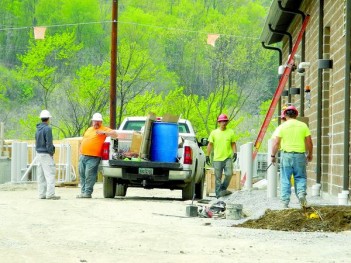
Wheeling’s new $30.55 million water treatment plant in Warwood nears completion. Such projects will be subject to less red tape in the future under a law approved by the West Virginia Legislature this year.
WHEELING, W.Va. — The Public Service Commission of West Virginia will have much less oversight of large municipal waterworks such as Wheeling’s under legislation approved by lawmakers during this year’s session.
Deregulation will cut much of the red tape for cities planning major water and wastewater construction projects, but opponents say the changes remove needed protections for consumers.
Under the new law, which takes effect June 12, municipal water and sewer rates for utilities with at least 4,500 customers and $3 million in annual revenue no longer will be subject to PSC approval. The changes also will make it more difficult for resale customers outside city limits to delay rate increases by lodging formal protests with the PSC.
Lisa Dooley, executive director of the West Virginia Municipal League, said her organization had pushed for wholesale deregulation of public utilities, but believes the more limited bill lawmakers approved is a step in the right direction. She said municipal utilities are forbidden by law from making a profit, making much of the PSC oversight unnecessary.
“We have elected officials who oversee the rates for these public utilities,” she said. “They’re held accountable at the ballot box.”
Wheeling officials likely would have been pleased to see that law passed a few years ago, before the city began construction of a new, $30.55 million water treatment plant that today is nearing completion.
In November 2011, City Council enacted a 70-percent rate increase to fund the new plant, which the PSC later rolled back to about 53 percent after protests by some of Wheeling’s resale customers, including the Ohio County Public Service District, the town of Triadelphia and the village of Valley Grove. The PSC didn’t render its decision until August 2012, and dirt didn’t start moving on the project until July 2013.
Wheeling also had to wait months for state officials to issue a “certificate of need” for the project, something large public utilities no longer will have to do under the new law. Dooley said requiring a certificate of need made little sense, particularly when so many projects are being mandated at the federal level.
“The only service that’s providing is slowing your project down, and anytime you slow a project down, it costs more money,” she said, noting such delays can add millions to a project’s cost, requiring them to turn around and increase rates even more.
The loudest voices against deregulation were from the PSC itself, according to Dooley, who described it as “nothing more than a turf battle.”
“Every bureaucrat has to prove their worth, and that’s really the only opposition we heard of,” she said.
To read more from The Intelligencer/Wheeling News-Register, subscribe here.






